Resume
Anesthesiologist Cover Letter Examples

May 29, 2025
|
12 min read
Discover the art of crafting a compelling anesthesiologist cover letter and ensure your application doesn’t put employers to sleep! Learn how to detail your unique skills, experience, and passion, ensuring you stand out in the medical field.
4.70 Average rating
Rated by 348 people
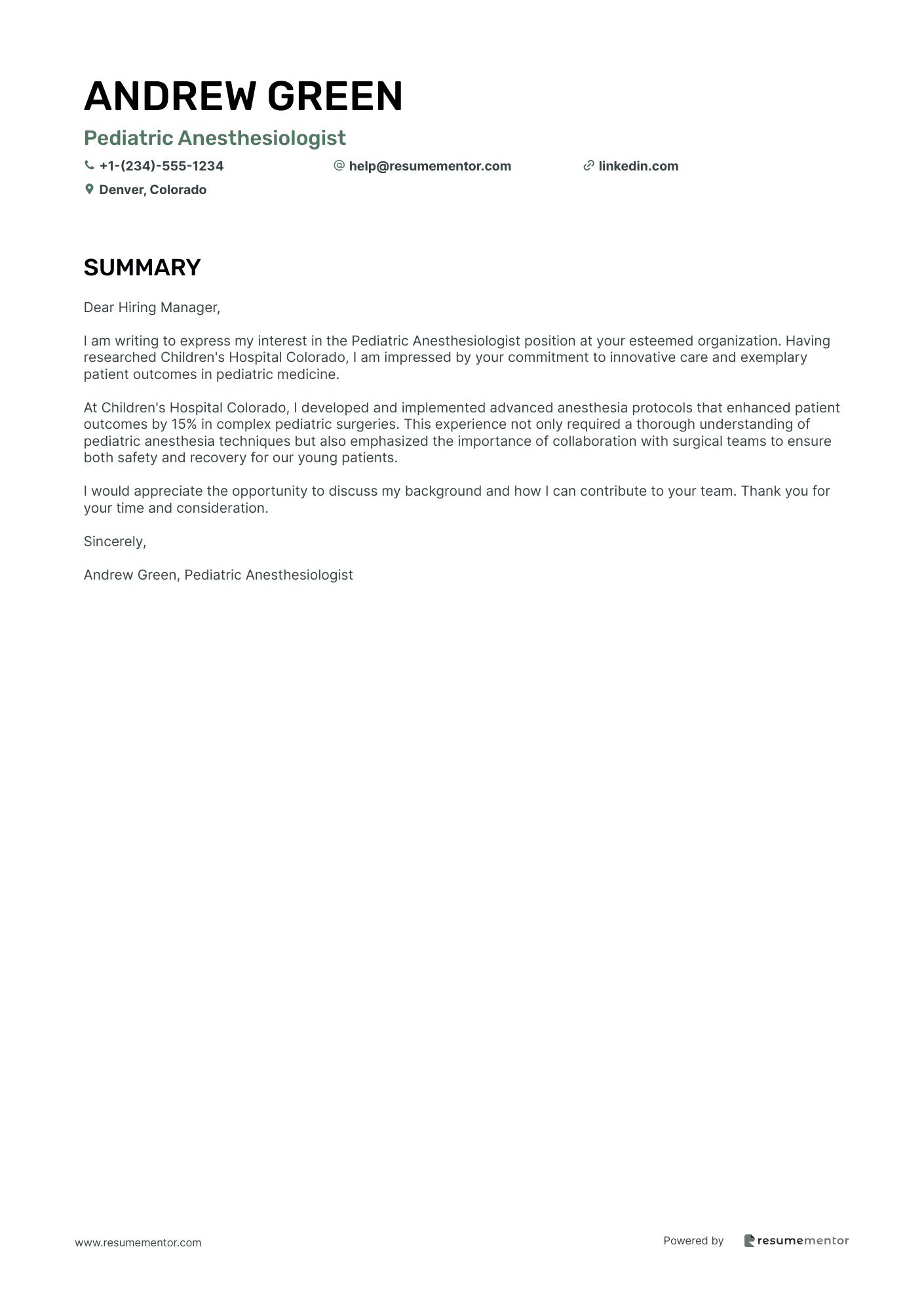
Pediatric Anesthesiologist
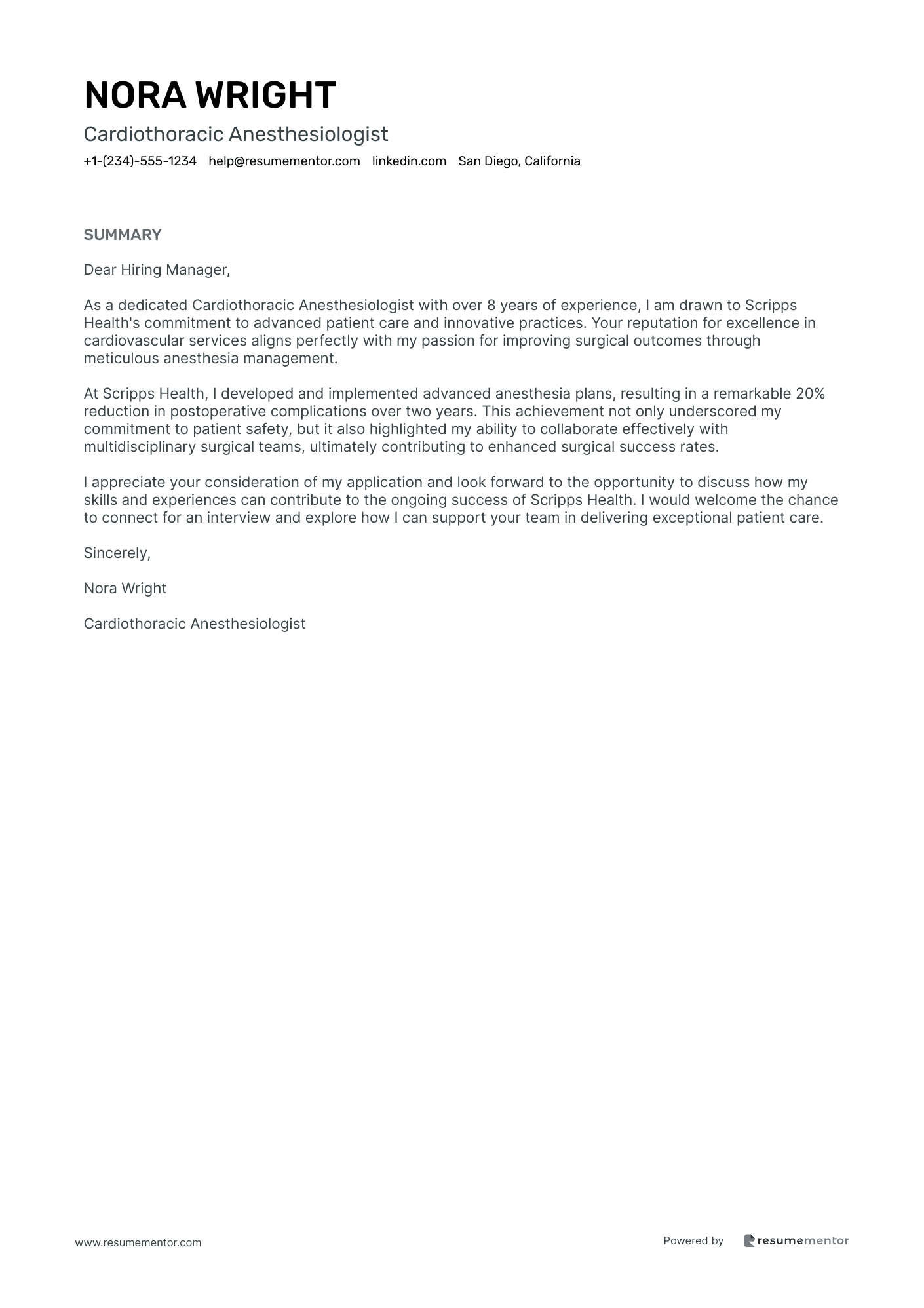
Cardiothoracic Anesthesiologist
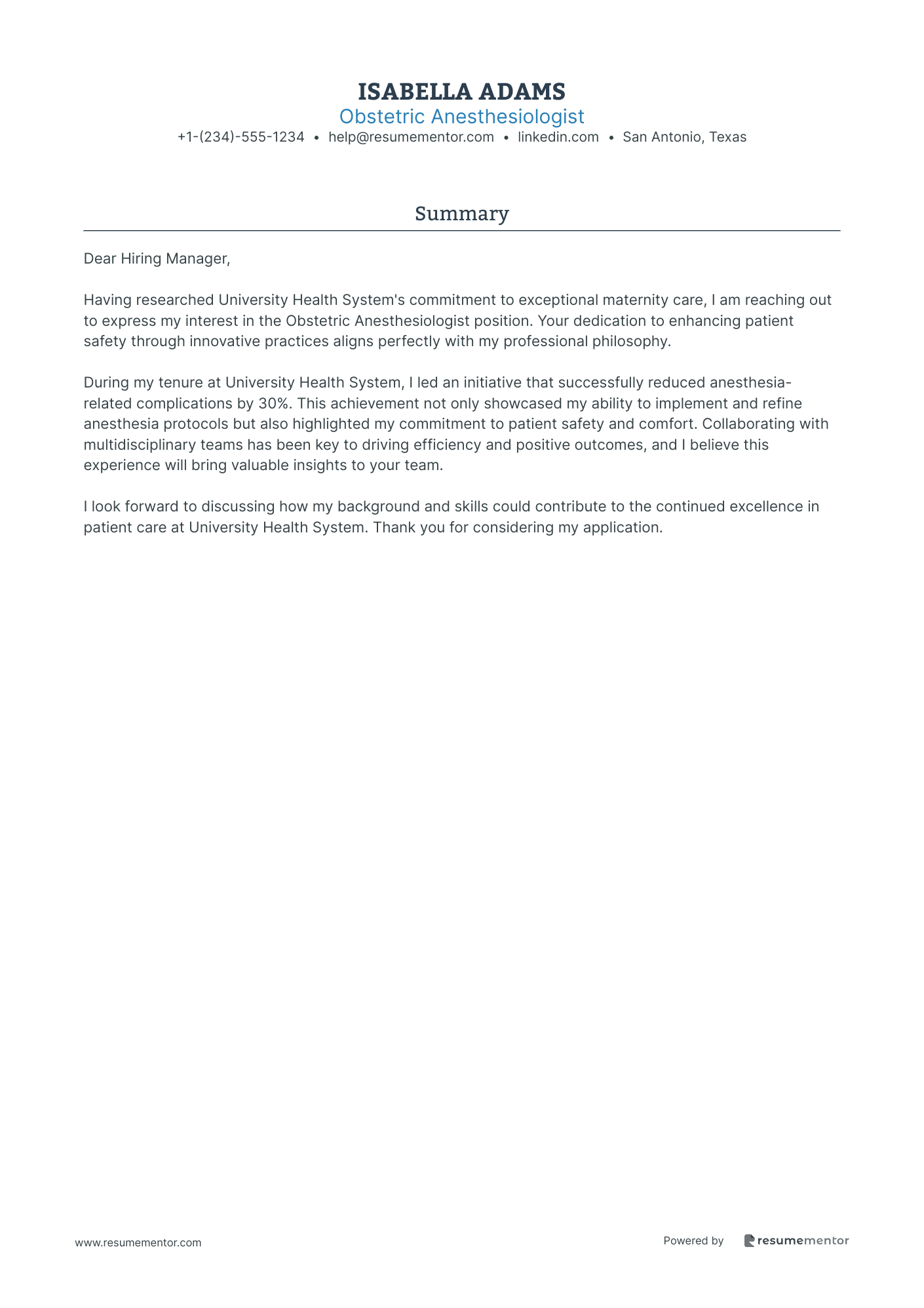
Obstetric Anesthesiologist
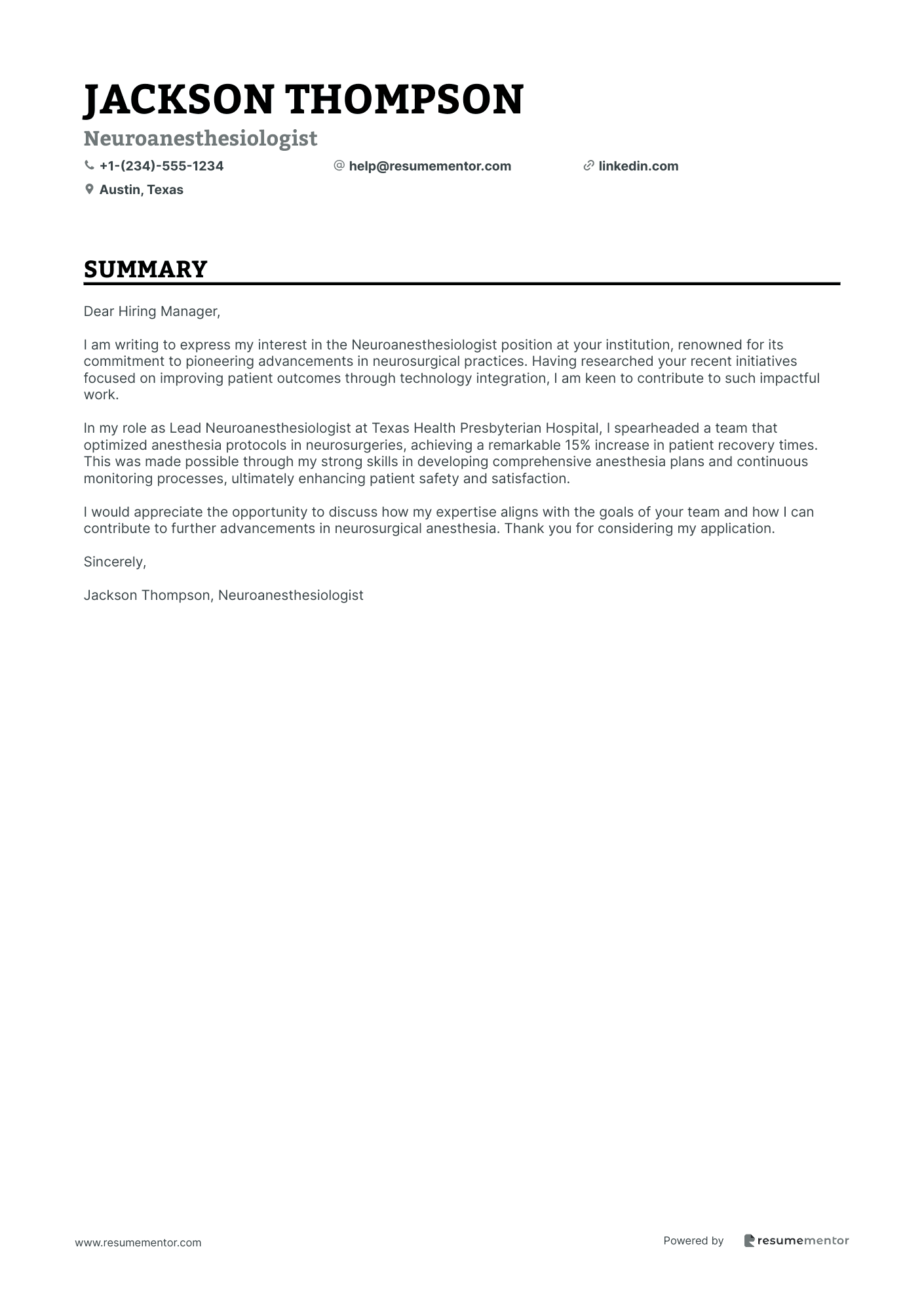
Neuroanesthesiologist
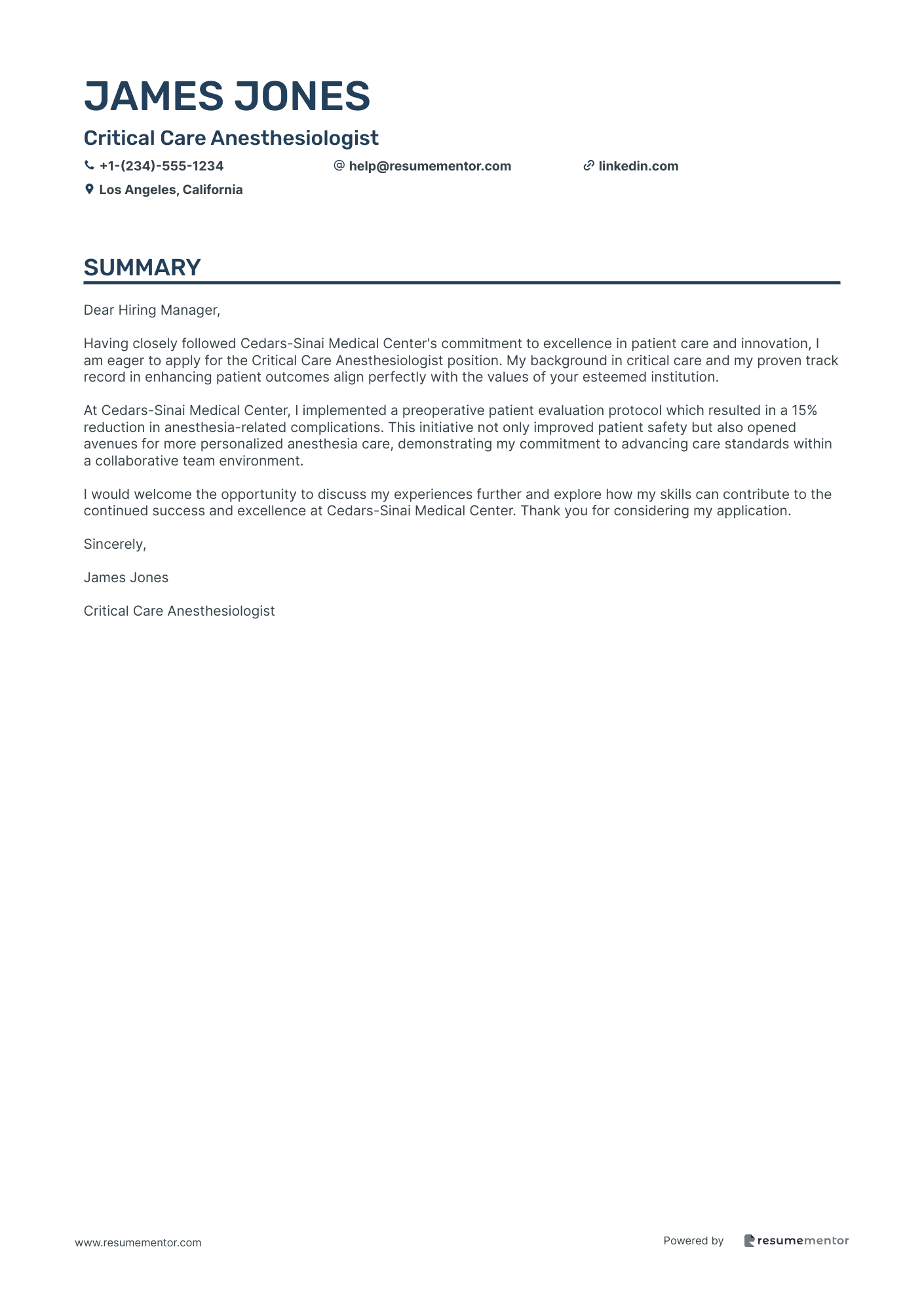
Critical Care Anesthesiologist
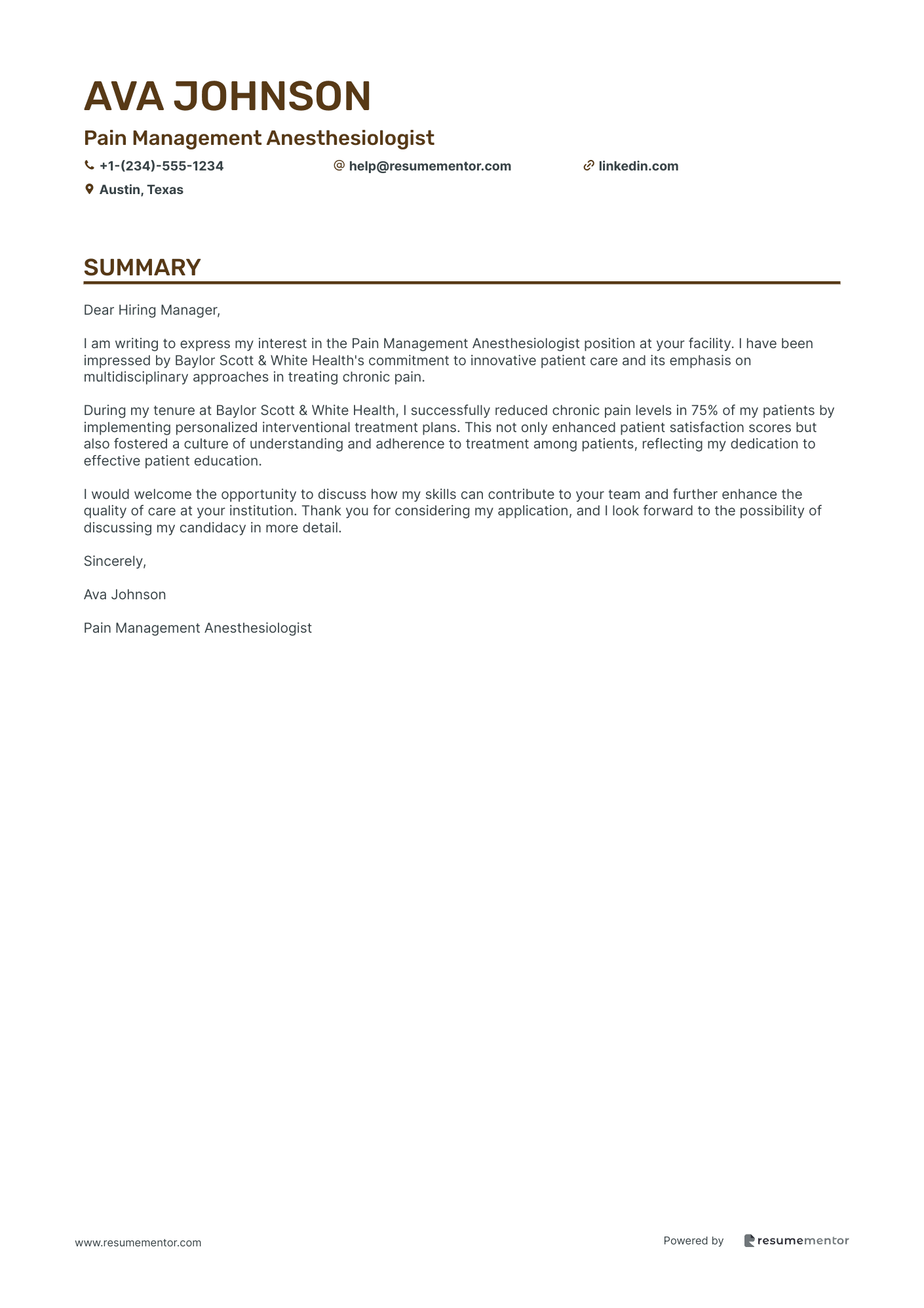
Pain Management Anesthesiologist
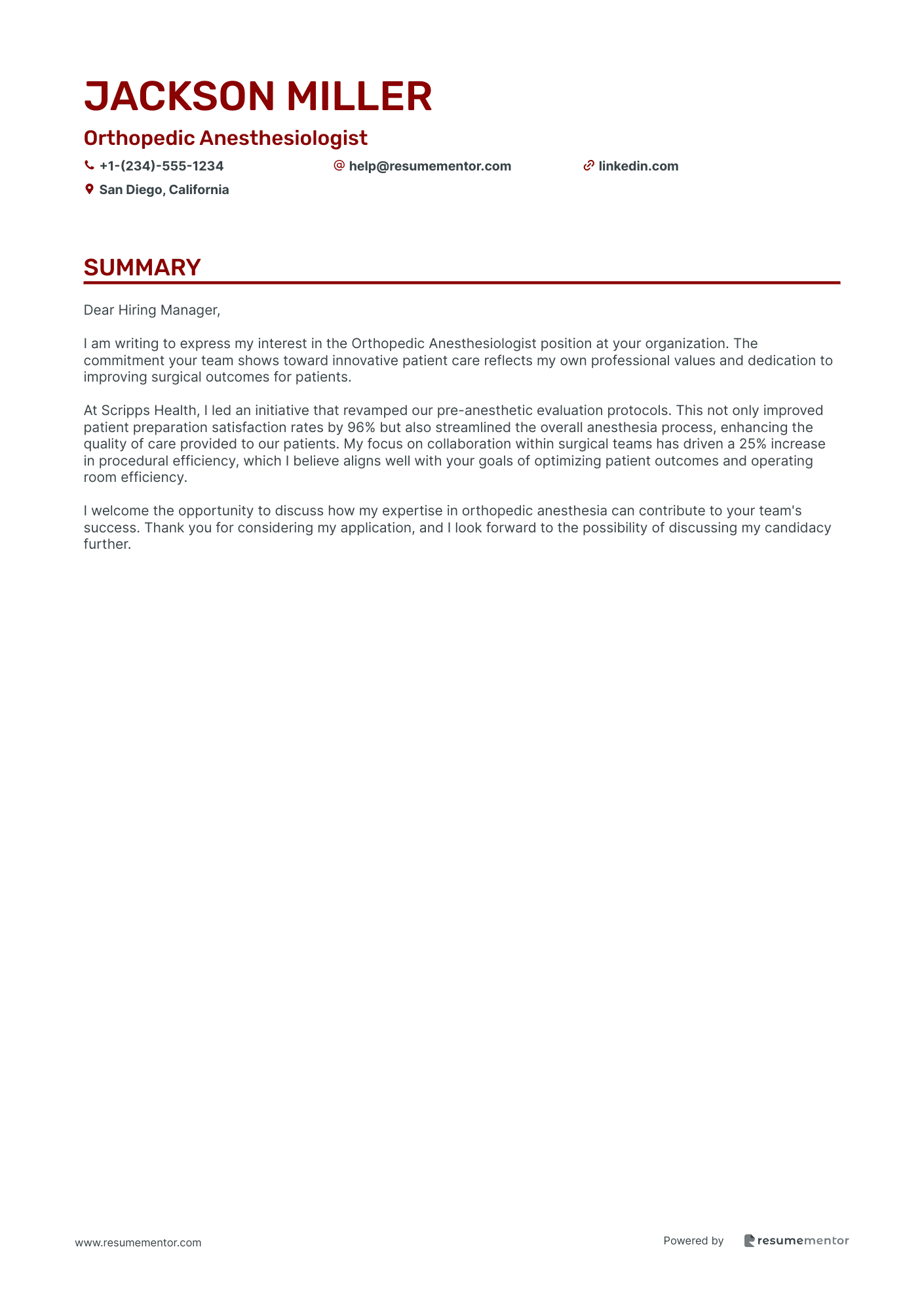
Orthopedic Anesthesiologist
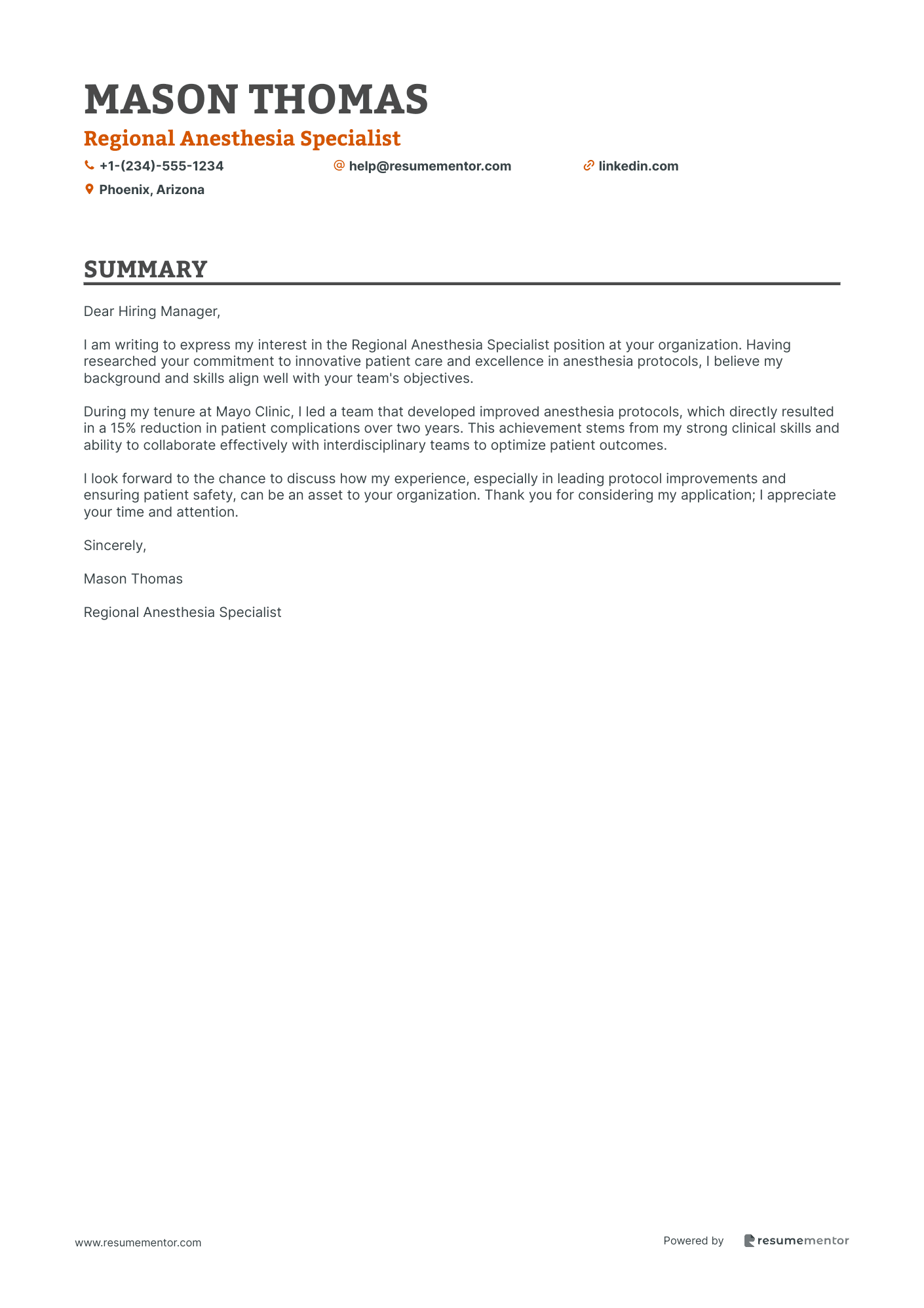
Regional Anesthesia Specialist
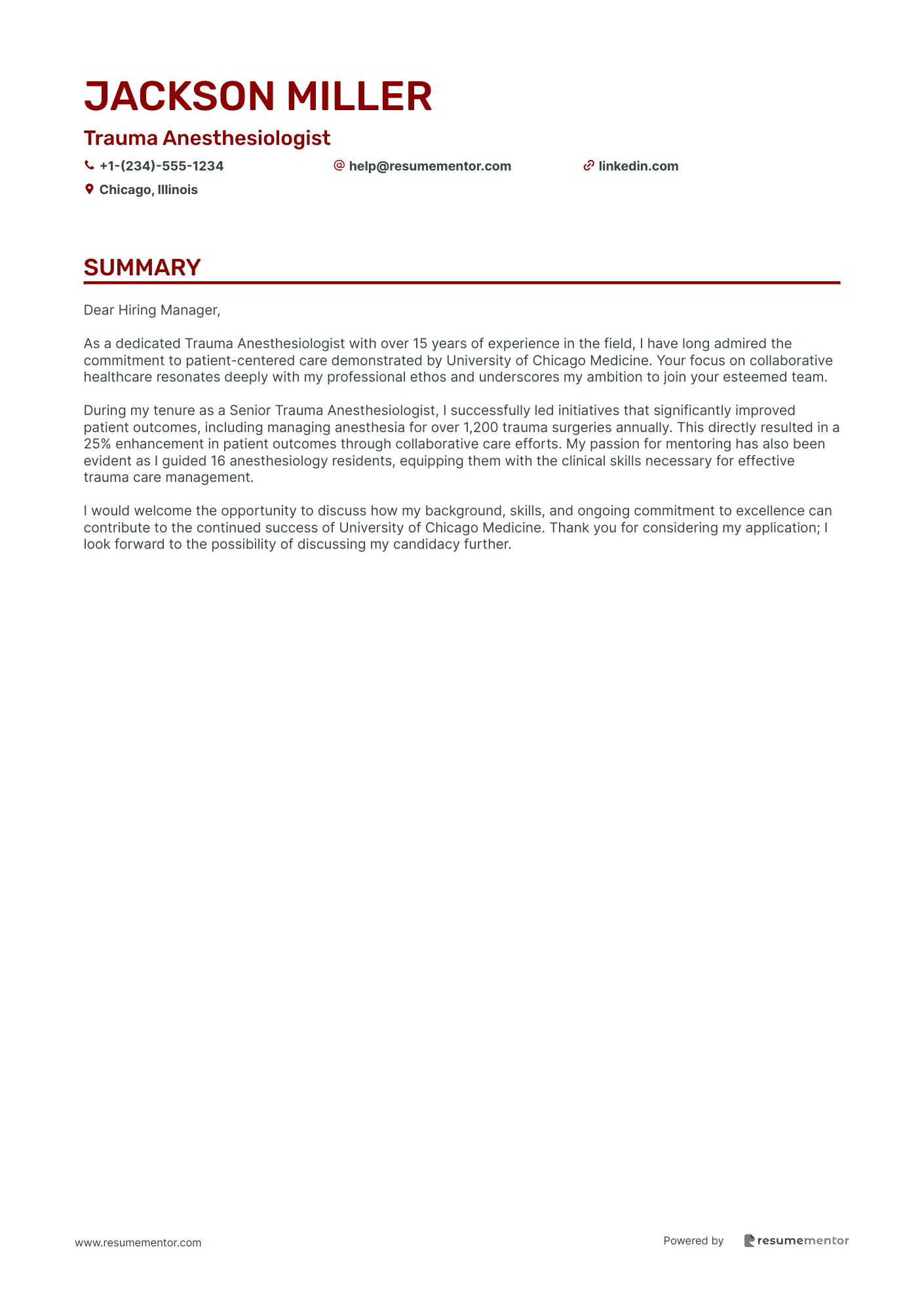
Trauma Anesthesiologist
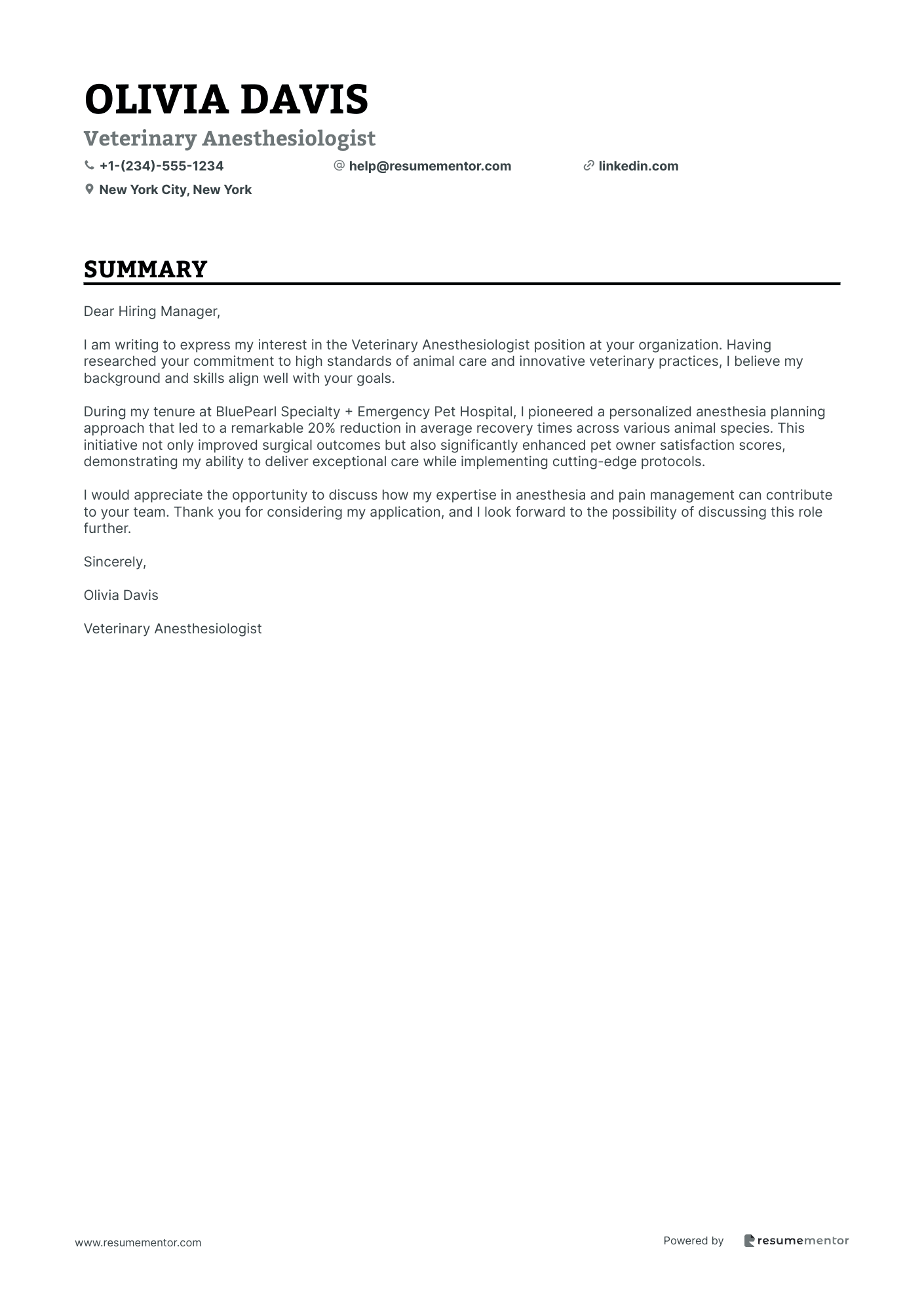
Veterinary Anesthesiologist

Pediatric Anesthesiologist cover letter sample
When applying for this role, it's essential to showcase your experience with pediatric patients, including specific cases you've managed. Highlight your proficiency in administering anesthesia to children and discuss your familiarity with age-specific protocols. Include any certifications like Pediatric Advanced Life Support (PALS) and relevant training programs. Stress your teamwork abilities, especially in surgical settings, and provide examples of how your interventions have improved patient outcomes. Utilize the 'skill-action-result' format to demonstrate your impact on patient safety and comfort.
Andrew Green
Pediatric Anesthesiologist
Summary
Dear Hiring Manager,
I am writing to express my interest in the Pediatric Anesthesiologist position at your esteemed organization. Having researched Children's Hospital Colorado, I am impressed by your commitment to innovative care and exemplary patient outcomes in pediatric medicine.
At Children's Hospital Colorado, I developed and implemented advanced anesthesia protocols that enhanced patient outcomes by 15% in complex pediatric surgeries. This experience not only required a thorough understanding of pediatric anesthesia techniques but also emphasized the importance of collaboration with surgical teams to ensure both safety and recovery for our young patients.
I would appreciate the opportunity to discuss my background and how I can contribute to your team. Thank you for your time and consideration.
Sincerely,
Andrew Green, Pediatric Anesthesiologist
Cardiothoracic Anesthesiologist cover letter sample
When applying for this role, focus on your extensive clinical experience and any specialized training in cardiac anesthesia. Highlight proficiency in advanced monitoring techniques and your ability to manage complex patient situations. Stress your strong teamwork skills and collaboration with surgical teams, as these are essential for successful outcomes. Include examples of how your quick decision-making skills have positively impacted patient safety and recovery. Additionally, mentioning any research or publications related to anesthesia can demonstrate your commitment to the field.
Nora Wright
Cardiothoracic Anesthesiologist
Summary
Dear Hiring Manager,
As a dedicated Cardiothoracic Anesthesiologist with over 8 years of experience, I am drawn to Scripps Health's commitment to advanced patient care and innovative practices. Your reputation for excellence in cardiovascular services aligns perfectly with my passion for improving surgical outcomes through meticulous anesthesia management.
At Scripps Health, I developed and implemented advanced anesthesia plans, resulting in a remarkable 20% reduction in postoperative complications over two years. This achievement not only underscored my commitment to patient safety, but it also highlighted my ability to collaborate effectively with multidisciplinary surgical teams, ultimately contributing to enhanced surgical success rates.
I appreciate your consideration of my application and look forward to the opportunity to discuss how my skills and experiences can contribute to the ongoing success of Scripps Health. I would welcome the chance to connect for an interview and explore how I can support your team in delivering exceptional patient care.
Sincerely,
Nora Wright
Cardiothoracic Anesthesiologist
Obstetric Anesthesiologist cover letter sample
When applying for this role, emphasize your experience with managing pain relief during labor and delivery. Highlight any specialized training in regional anesthesia techniques, such as epidurals and spinals. Showcase your ability to collaborate effectively with obstetricians and nursing staff to ensure patient safety and comfort. Include any research or projects you've undertaken that focus on maternal-fetal medicine. Provide examples demonstrating how your interventions positively impacted patient outcomes, using a 'skill-action-result' format to make your achievements clear and compelling.
Isabella Adams
Obstetric Anesthesiologist
Summary
Dear Hiring Manager,
Having researched University Health System's commitment to exceptional maternity care, I am reaching out to express my interest in the Obstetric Anesthesiologist position. Your dedication to enhancing patient safety through innovative practices aligns perfectly with my professional philosophy.
During my tenure at University Health System, I led an initiative that successfully reduced anesthesia-related complications by 30%. This achievement not only showcased my ability to implement and refine anesthesia protocols but also highlighted my commitment to patient safety and comfort. Collaborating with multidisciplinary teams has been key to driving efficiency and positive outcomes, and I believe this experience will bring valuable insights to your team.
I look forward to discussing how my background and skills could contribute to the continued excellence in patient care at University Health System. Thank you for considering my application.
Neuroanesthesiologist cover letter sample
When applying for this position, it’s important to highlight any specialized training in anesthesia and neurology. Mention your experience with managing patients undergoing neurological procedures. Collaborate with surgical teams to showcase your teamwork skills. Acknowledge any research or publications related to anesthesia or brain function, as this reflects your commitment to the field. Provide examples of how your interventions have improved patient outcomes, focusing on a 'skill-action-result' framework. Finally, detail your approach to patient safety and comfort to demonstrate your holistic care philosophy.
Jackson Thompson
Neuroanesthesiologist
Summary
Dear Hiring Manager,
I am writing to express my interest in the Neuroanesthesiologist position at your institution, renowned for its commitment to pioneering advancements in neurosurgical practices. Having researched your recent initiatives focused on improving patient outcomes through technology integration, I am keen to contribute to such impactful work.
In my role as Lead Neuroanesthesiologist at Texas Health Presbyterian Hospital, I spearheaded a team that optimized anesthesia protocols in neurosurgeries, achieving a remarkable 15% increase in patient recovery times. This was made possible through my strong skills in developing comprehensive anesthesia plans and continuous monitoring processes, ultimately enhancing patient safety and satisfaction.
I would appreciate the opportunity to discuss how my expertise aligns with the goals of your team and how I can contribute to further advancements in neurosurgical anesthesia. Thank you for considering my application.
Sincerely,
Jackson Thompson, Neuroanesthesiologist
Critical Care Anesthesiologist cover letter sample
When applying for this position, it’s important to emphasize your clinical experience in critical care settings. Highlight any fellowships or specialized training in anesthesia, particularly in critical environments. Make sure to mention your ability to work in high-pressure situations and detail your familiarity with advanced monitoring equipment. Provide examples of how your interventions have improved patient outcomes, using a 'skill-action-result' approach. Additionally, include any relevant certifications or continued education to demonstrate your commitment to evolving practices in patient care.
James Jones
Critical Care Anesthesiologist
Summary
Dear Hiring Manager,
Having closely followed Cedars-Sinai Medical Center's commitment to excellence in patient care and innovation, I am eager to apply for the Critical Care Anesthesiologist position. My background in critical care and my proven track record in enhancing patient outcomes align perfectly with the values of your esteemed institution.
At Cedars-Sinai Medical Center, I implemented a preoperative patient evaluation protocol which resulted in a 15% reduction in anesthesia-related complications. This initiative not only improved patient safety but also opened avenues for more personalized anesthesia care, demonstrating my commitment to advancing care standards within a collaborative team environment.
I would welcome the opportunity to discuss my experiences further and explore how my skills can contribute to the continued success and excellence at Cedars-Sinai Medical Center. Thank you for considering my application.
Sincerely,
James Jones
Critical Care Anesthesiologist
Pain Management Anesthesiologist cover letter sample
When crafting your cover letter, focus on any specialized training in pain management technologies or techniques. Include your experience with various anesthetic methods, as well as any certifications in interventional pain management. Highlight your patient communication skills, especially how you assess and address pain issues effectively. Provide specific cases where your interventions led to improved outcomes for your patients. Using a 'skill-action-result' format will strengthen your application by showing the direct impact of your expertise on patient care and satisfaction.
Ava Johnson
Pain Management Anesthesiologist
Summary
Dear Hiring Manager,
I am writing to express my interest in the Pain Management Anesthesiologist position at your facility. I have been impressed by Baylor Scott & White Health's commitment to innovative patient care and its emphasis on multidisciplinary approaches in treating chronic pain.
During my tenure at Baylor Scott & White Health, I successfully reduced chronic pain levels in 75% of my patients by implementing personalized interventional treatment plans. This not only enhanced patient satisfaction scores but also fostered a culture of understanding and adherence to treatment among patients, reflecting my dedication to effective patient education.
I would welcome the opportunity to discuss how my skills can contribute to your team and further enhance the quality of care at your institution. Thank you for considering my application, and I look forward to the possibility of discussing my candidacy in more detail.
Sincerely,
Ava Johnson
Pain Management Anesthesiologist
Orthopedic Anesthesiologist cover letter sample
When crafting your cover letter, focus on your clinical experience in pain management and sedation techniques. Highlight any specialized training in anesthetic protocols for orthopedic procedures. Mention your ability to collaborate effectively with surgeons and nursing staff to ensure optimal patient outcomes. Include examples of how you've improved patient safety or reduced recovery times, using specific metrics to underscore your contributions. Don’t forget to emphasize your commitment to ongoing education and staying updated on advancements in anesthesia. This will demonstrate your dedication to excellence in patient care.
Jackson Miller
Orthopedic Anesthesiologist
Summary
Dear Hiring Manager,
I am writing to express my interest in the Orthopedic Anesthesiologist position at your organization. The commitment your team shows toward innovative patient care reflects my own professional values and dedication to improving surgical outcomes for patients.
At Scripps Health, I led an initiative that revamped our pre-anesthetic evaluation protocols. This not only improved patient preparation satisfaction rates by 96% but also streamlined the overall anesthesia process, enhancing the quality of care provided to our patients. My focus on collaboration within surgical teams has driven a 25% increase in procedural efficiency, which I believe aligns well with your goals of optimizing patient outcomes and operating room efficiency.
I welcome the opportunity to discuss how my expertise in orthopedic anesthesia can contribute to your team's success. Thank you for considering my application, and I look forward to the possibility of discussing my candidacy further.
Regional Anesthesia Specialist cover letter sample
In your cover letter, focus on any experience with pain management or anesthesia techniques, as these are crucial for the role. Highlight your ability to work effectively in a team, especially in high-pressure environments like surgeries. Mention certifications such as Advanced Cardiac Life Support (ACLS) or any specialized anesthesia training you've completed. Also, provide examples of how your clinical decisions improved patient outcomes or reduced recovery times using a 'skill-action-result' format. This approach will show your contributions clearly and strengthen your application.
Mason Thomas
Regional Anesthesia Specialist
Summary
Dear Hiring Manager,
I am writing to express my interest in the Regional Anesthesia Specialist position at your organization. Having researched your commitment to innovative patient care and excellence in anesthesia protocols, I believe my background and skills align well with your team's objectives.
During my tenure at Mayo Clinic, I led a team that developed improved anesthesia protocols, which directly resulted in a 15% reduction in patient complications over two years. This achievement stems from my strong clinical skills and ability to collaborate effectively with interdisciplinary teams to optimize patient outcomes.
I look forward to the chance to discuss how my experience, especially in leading protocol improvements and ensuring patient safety, can be an asset to your organization. Thank you for considering my application; I appreciate your time and attention.
Sincerely,
Mason Thomas
Regional Anesthesia Specialist
Trauma Anesthesiologist cover letter sample
When applying for this position, emphasize any prior experience in critical care or emergency medicine. Highlight your proficiency in advanced airway management and analgesia techniques. Showcase any certifications from recognized bodies, like those in trauma management or regional anesthesia. It’s vital to mention your experience with interdisciplinary teams and how your collaboration has improved patient outcomes. Use specific examples that follow a 'skill-action-result' format to illustrate how your expertise has saved lives or improved surgical efficiency in high-pressure environments.
Jackson Miller
Trauma Anesthesiologist
Summary
Dear Hiring Manager,
As a dedicated Trauma Anesthesiologist with over 15 years of experience in the field, I have long admired the commitment to patient-centered care demonstrated by University of Chicago Medicine. Your focus on collaborative healthcare resonates deeply with my professional ethos and underscores my ambition to join your esteemed team.
During my tenure as a Senior Trauma Anesthesiologist, I successfully led initiatives that significantly improved patient outcomes, including managing anesthesia for over 1,200 trauma surgeries annually. This directly resulted in a 25% enhancement in patient outcomes through collaborative care efforts. My passion for mentoring has also been evident as I guided 16 anesthesiology residents, equipping them with the clinical skills necessary for effective trauma care management.
I would welcome the opportunity to discuss how my background, skills, and ongoing commitment to excellence can contribute to the continued success of University of Chicago Medicine. Thank you for considering my application; I look forward to the possibility of discussing my candidacy further.
Veterinary Anesthesiologist cover letter sample
When crafting your cover letter, emphasize any hands-on experience in anesthesia for animals. Discuss your technical skills, such as monitoring vital signs and managing anesthesia depth. If you have completed specialized training or certifications in veterinary anesthesia, be sure to include those details. Highlight your ability to work under pressure and your commitment to animal welfare. Use specific examples that demonstrate how your expertise improved surgical outcomes or contributed to team efficiency, adhering to the 'skill-action-result' method for clarity and impact.
Olivia Davis
Veterinary Anesthesiologist
Summary
Dear Hiring Manager,
I am writing to express my interest in the Veterinary Anesthesiologist position at your organization. Having researched your commitment to high standards of animal care and innovative veterinary practices, I believe my background and skills align well with your goals.
During my tenure at BluePearl Specialty + Emergency Pet Hospital, I pioneered a personalized anesthesia planning approach that led to a remarkable 20% reduction in average recovery times across various animal species. This initiative not only improved surgical outcomes but also significantly enhanced pet owner satisfaction scores, demonstrating my ability to deliver exceptional care while implementing cutting-edge protocols.
I would appreciate the opportunity to discuss how my expertise in anesthesia and pain management can contribute to your team. Thank you for considering my application, and I look forward to the possibility of discussing this role further.
Sincerely,
Olivia Davis
Veterinary Anesthesiologist
Related Articles

Continue Reading
Check more recommended readings to get the job of your dreams.
Resume
Resources
Tools
© 2026. All rights reserved.
Made with love by people who care.
